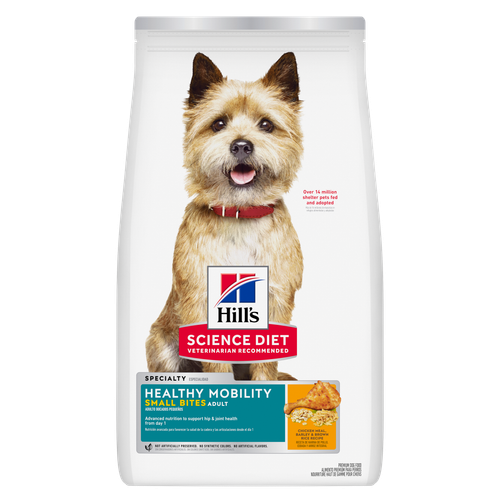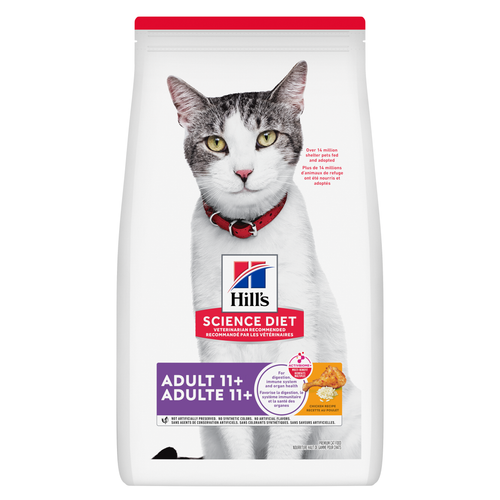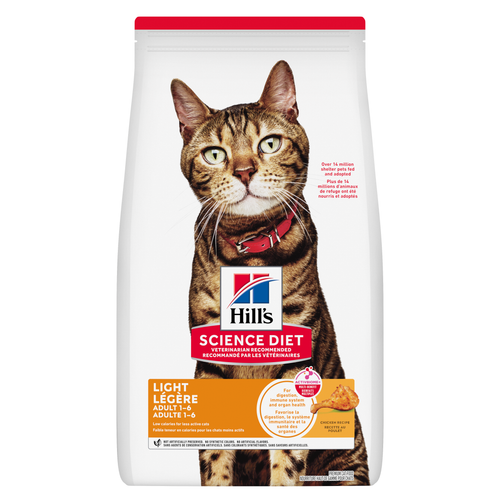
-
Find the right food for your petTake this quiz to see which food may be the best for your furry friend.Find the right food for your petTake this quiz to see which food may be the best for your furry friend.Featured products
 Adult Healthy Mobility Small Bites Chicken Meal, Barley & Brown Rice Recipe Dog Food
Adult Healthy Mobility Small Bites Chicken Meal, Barley & Brown Rice Recipe Dog FoodAdvanced nutrition to support hip & joint health from day 1
Shop Now Adult Sensitive Stomach & Skin Small & Mini Chicken Recipe Dog Food
Adult Sensitive Stomach & Skin Small & Mini Chicken Recipe Dog FoodHill's Science Diet Sensitive Stomach & Skin Small & Mini dry dog food is tailored nutrition for Small & Mini dogs while being gentle on stomachs. Nourishes skin & promotes a lustrous coat.
Shop Now Adult Light Large Breed Chicken Meal & Barley Recipe Dog Food
Adult Light Large Breed Chicken Meal & Barley Recipe Dog Food18% lower calories vs. Science Diet Large Breed Adult
Shop NowFeatured products Adult 11+ Chicken Recipe Cat Food
Adult 11+ Chicken Recipe Cat FoodSupports brain health & beautiful fur. Helps keep immune system, heart & kidneys healthy.
Shop Now Adult Healthy Cuisine Seared Tuna & Carrot Medley Cat Food
Adult Healthy Cuisine Seared Tuna & Carrot Medley Cat FoodDelicious seared tuna paired with tender carrots in a mouthwatering sauce
Shop Now Adult Light Chicken Recipe Cat Food
Adult Light Chicken Recipe Cat Food20% lower calories vs. Hill's Science Diet Adult
Shop Now -
Dog
- Dog Tips & Articles
-
Health Category
- Weight
- Food & Environmental Sensitivities
- Urinary
- Digestive
- Joint
- Kidney
- Dental
- Cancer
-
Life Stage
- Puppy Nutrition
- Adult Nutrition
- Senior Nutrition
Cat- Cat Tips & Articles
-
Health Category
- Weight
- Skin & Food Sensitivities
- Urinary
- Digestive
- Kidney
- Dental
- Stress
- Cancer
-
Life Stage
- Kitten Nutrition
- Adult Nutrition
Featured articles Antioxidants
AntioxidantsUnderstand the importance of antioxidants in your dog or cat's food, and how they can help protect your pet and keep them healthy.
Read More Water
WaterDiscover why water is the most important nutrient for your dog or cat to live a healthy life. Find out how much water your pet should consume each day.
Read More Importance of DHA in your Pet's Food
Importance of DHA in your Pet's FoodLearn about DHA, Docosahexaenoic Acid, a natural omega-3 fatty acid that is essential in the development of the brain and nervous system in cats & dogs.
Read More -


What is diabetes?
Diabetes mellitus is a condition that develops when your cat cannot use sugar (glucose) effectively and control the sugar level in her blood. Insulin, which is made in the pancreas, is essential for regulating the use and storage of blood glucose. Insufficient insulin production is potentially life threatening.
There are two types of diabetes, and although there is no cure, cats with either type can be successfully managed through nutrition, exercise, and if necessary, regular insulin medication. With the right cat food and advice from your veterinarian, your diabetic cat can enjoy a happy, active life.
What causes diabetes?
A reduction in insulin production is usually caused by damage to the pancreas. The pancreas is responsible for producing the proper amount of insulin to control sugar levels. If your cat's pancreas is damaged, long-term and potentially life-threatening symptoms could occur and must be managed. In some cats hormonal changes or medications can reduce the effect of insulin. Other factors that increase the chance of your cat developing diabetes include:
Body condition: Overweight cats are more likely to develop diabetes. Severely obese cats are most at risk.
Age: Cats can develop diabetes at any age, but the peak onset is around 8 years.
Gender: Diabetes in cats is more prevalent in males
Breed: Burmese are more at, risk than other breeds.
Other Factors: Poor nutrition, hormonal abnormalities, stress
Does my cat have diabetes?
The signs of diabetes are difficult to recognize because they are similar to those of other disorders like chronic kidney disease and hyperthyroidism. If you notice any of the following, it could mean your cat has diabetes.
Signs and symptoms of diabetes:
- Increased thirst
- Rapid weight loss
- Not eating
- Tired, lack of energy
- Vomiting
- Increased urination

* Noted in cats by “clumping” in the litter box and the need to change litter more often
If your cat appears weak or thirsty, frequently urinates, has rapid weight loss, is depressed, or has abdominal pain, she could be diabetic.
IMPORTANT: Once diabetes is diagnosed, it is important that your cat is regularly monitored. Your veterinarian will check your cat’s glucose levels and will adjust medication to keep your cat stable.


Tasty Tips
Establish a routine: The key to keeping a diabetic cat healthy is routine. Feeding, exercise and, if necessary, giving medication should take place at the same times each day. This helps maintain stable blood glucose levels. Your veterinarian will give you advice.
While there is no cure for diabetes mellitus, veterinarians recognize it can be controlled with insulin, exercise and proper nutrition. Fiber is key in managing the disease because moderate to high-levels of fiber lower insulin requirements and blood glucose levels. Fiber also makes the body more responsive to insulin.
Diabetes Treatment: The importance of nutrition
It’s also very important to be consistent in the food you give your cat. The food your cat eats plays an important role in her overall health and well-being. Balanced nutrition is an essential part of an active, healthy lifestyle. When your cat has diabetes, it’s even more important to feed the right cat food.
Feeding a veterinarian-recommended cat food with a consistent nutrient profile --- one that doesn’t vary from batch to batch --- will help keep your cat's metabolism level stable so she can stay healthy.
For accurate diagnosis and treatment options, always consult your veterinarian and ask them to recommend the best food for your cat’s diabetes.
Questions to Ask Your Veterinarian about Diabetes
- What are the treatment options for my cat’s diabetes?
- Ask how nutrition works with other available options
- Should nutrition be a part of my cat’s treatment regimen? Would you recommend a Hill’s® Prescription Diet® cat food for my cat’s health and management of diabetes?
- What if I have multiple cats? Can I feed them all the same cat food?
- How can nutrition help? What is the benefit of feeding therapeutic nutrition as part of treatment which may include administering pills or shots?
- ,
- What are the pros and cons of using nutrition to help manage my cat’s diabetes?
- How long will I need to feed the recommended cat food to my cat?
- What is the best way (email/phone) to reach you or your hospital if I have questions?
- Ask if you need a follow-up appointment.
- Ask if a reminder email or notice will be sent.


One of our staff authors prepared this article for you
Related products

Delicious seared tuna paired with tender carrots in a mouthwatering sauce

Supports brain health & beautiful fur. Helps keep immune system, heart & kidneys healthy.

20% lower calories vs. Hill's Science Diet Adult

With delicious chunks in a decadent gravy
Related articles

Discover how to train your cat, starting with very basic first steps that both reward good behavior and discourage the bad.

Discover the benefits of Hill's line of kitten foods and how they provide complete and balance nutrition for growing kittens.

Cats are naturally very clean and chances are your kitten will already have learned how to use the litter box from her mother before she comes to live with you.

When you adopt a cat, you don't just gain a best friend; you also save her life. Here's why getting a cat from a local animal shelter makes so much sense.

Put your cat on a diet without them knowing
Our low calorie formula helps you control your cat's weight. It's packed with high-quality protein for building lean muscles, and made with purposeful ingredients for a flavorful, nutritious meal. Clinically proven antioxidants, Vitamin C+E, help promote a healthy immune system.
Put your cat on a diet without them knowing
Our low calorie formula helps you control your cat's weight. It's packed with high-quality protein for building lean muscles, and made with purposeful ingredients for a flavorful, nutritious meal. Clinically proven antioxidants, Vitamin C+E, help promote a healthy immune system.

